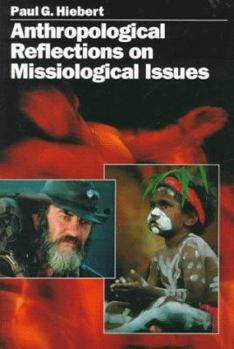Anthropological Reflections on Missiological Issues
Select Format
Select Condition 
Book Overview
These reflections by a leading evangelical anthropologist reveal how insights from anthropology can help missionaries communicate biblical content without syncretism. The author advocates a trialogue uniting theology, anthropology, and missions in the work of worldwide evangelism.
Format:Paperback
Language:English
ISBN:0801043948
ISBN13:9780801043949
Release Date:November 1994
Publisher:Baker Academic
Length:272 Pages
Weight:0.98 lbs.
Dimensions:0.7" x 6.0" x 8.9"
Age Range:18 years and up
Grade Range:Postsecondary and higher
Customer Reviews
4 ratings
Must reading for missionaries and pastors
Published by Thriftbooks.com User , 16 years ago
Hiebert does a great job of presenting some very thought-provoking essays on questions of missiology and culture. In doing so he provides a valuable correction to the mono-cultural perspective of so many, who naively assume that the way things are done in their culture are the "right" way. I would recommend that that all would-be missionaries and pastors who have an interest in mission (which should be all of them) read this book. It will provoke serious reflection and thinking in important areas. I do not per se agree with everything Hiebert says; personally I am not comfortable with how much he is willing to assign to the category of "cultural differences" and how little ends up in the "objectively true" category. However, this should not dissuade one from reading the book. Hiebert works very hard to fairly present the spectrum of views and will help your thinking whether or not you ultimately agree with him.
A Strong Start, Then Some Pitfalls
Published by Thriftbooks.com User , 18 years ago
Paul G. Hiebert is a well known anthropologist and missiologist. He begins this book, unusually, with a prototheological phase -- a careful investigation of epistemology, or the theory of knowledge. "Most Christians," he writes, "do not examine their epistemological foundations." Thus he describes six major approaches to epistemology, methodically applying these to theology and missiology. It was Hiebert who first introduced the term "excluded middle" to theology. This is originally a philosophical term which refers to the exclusion of "middle cases" between logical alternatives. The theological "excluded middle" has been a pervasive characteristic of the Church in the West. The Church has had "a theology of God in cosmic history", and "an awareness of God in natural history", yet it has tended to exclude "a theology of God in human history". This may refer either to God's present acts in "human history and . . . personal biography", or to the reality of "the spirit world". Thus Western missionaries have frequently found themselves in situations where they have been unable to address questions of "the middle level", to relate the gospel e.g. to the need for divine guidance or demonic influences. In Hiebert's view, in order to contextualise the Christian faith, one needs to begin with two certainties -- at least, with two "maps". He proposes the necessity of a "metacultural grid" and a "metatheological truth". Once one has established these two universal systems, one may begin to "compare and translate", with a view to changing "old beliefs and practices". His universal "maps" are possible because, he writes, "no people confuse cows with pigs". That is, we may establish (by and large) objective universals for our task, since these reliably refer to reality. Yet things are surely not that simple. One may worship cows on the one hand, or create beef stroganoff with them on the other. This being the case, one surely would require something more radically transformative than "maps" for the task of translating culture. One of the highlights of the book is an analogy that Hiebert draws between the Church and set theory. A set is essentially "a group" of things. However, the nature of sets can vary significantly. Two types of set receive particular attention, namely the "bounded set", and the "centered set". A bounded set, as the term suggests, has well defined bounds, while a centred set "groups things on the basis of how they relate to other things". Therefore in terms of a bounded set, we would classify the Church as a people who are "all the same in essence", while in terms of a centred set, "the church would be defined by its center, the Jesus Christ of Scripture". The trouble with the former, writes Hiebert, is that this may become too exacting and exclusive, while an advantage of the latter is that Jesus Christ becomes the focus of all that the Church is and does. At the "heart" level, a lot of this book resonated wit
Anthropological Reflections on Missiological Issues
Published by Thriftbooks.com User , 25 years ago
This is a collection of essays by one of the best missiologist/anthropologist writers of our day. Paul Hiebert provides lucid and stimulating papers on epistemology (also see his "Missiological Implications of Epistemological Shifts" (Trinity Press, 1999) Critical Contextualization (see also "Introduction to Folk Religion" co-authored with Shaw and Tienou (Baker 1999) and other great pieces on critical issues in cross-cultural ministry -- relevant not only for the overseas missionary or development worker, but also for people working in multicultural contexts in Europe, Canada and USA.
Excellent for those who are mission minded.
Published by Thriftbooks.com User , 25 years ago
An excellent book which has helped me to look at aspects of culture which I never noticed before. Raising new, interesting questions and providing a deep insight into them, very much focused on the bible. Also a book from which you can get loads of quotes.






